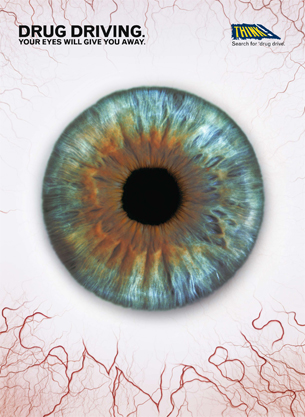
Glossary of drug driving effects
- Aggression
- Feeling hostile and destructive can lead to the driver taking unnecessary risks
- Anxiety
- Feeling apprehensive, uncertain and fearful without any apparent reason. This distracts attention from driving
- Auditory hallucinations
- Hearing voices (that are not there) which distract the person from driving
- Blurred vision
- Being unable to see clearly or focus, as the driver’s vision is misty or distorted
- Confused thinking
- Being unable to think straight therefore not being as good at judging distances and speed
- Cramps
- Muscles contracting painfully can cause the person to have difficulty controlling their car
- Distorted perception
- Being unable to see, hear, smell or touch accurately. The driver is then unable to accurately understand the meaning of road signs or take notice of their surroundings
- Dizziness
- Finding it difficult to concentrate on driving or take notice of surroundings because of lightheaded and unsteady feelings
- Enlarged pupils
- Being unable to see or focus properly, as the driver’s pupils are too open for the lighting conditions
- Erratic behaviour
- Unexpected or unpredictable behaviour can cause the driver to take unnecessary risks
- Field Impairment Assessment (FIA)
- A series of assessments administered by a trained professional designed to identify those driving impaired, under the influence of drugs
- Impaired coordination
- Finding it difficult to do several common tasks at the same time, such as safely steering the car, changing gears and checking mirrors
- Impaired judgement
- Being unable to make a correct decision
- Impaired steering control
- Being unable to safely control the car using the steering wheel, so the car may drift
- Increased risk taking
- Taking risks that the driver wouldn't otherwise take, and not realising how unnecessarily dangerous the risk can be
- Nausea
- The driver can be distracted from driving and unable to concentrate due to a sickness feeling
- Over confidence
- The feeling of being invincible on the road can lead to the driver taking unnecessary risks, without realising the danger
- Panic attacks
- Experiencing extreme and unreasonable fear and anxiety, distracting and preventing the driver from driving as safely as they usually do
- Paranoia
- The feeling of being persecuted causing the driver to act in an unexpected manner
- Poor concentration
- Unable to focus on the task of driving and being easily distracted by less important things
- Poor control
- Not having the same degree of control over one’s actions when driving, so not being able to get out of difficult situations on the road as efficiently
- Restless
- Finding it difficult to stay still or concentrate on driving, so that the driver behaves in an unexpected manner or takes unnecessary risks
- Sleepiness / Severe tiredness
- Being in danger of falling asleep at the wheel. The driver is also unable to react quickly, concentrate, or take notice of their surroundings
- Short term memory loss
- Being unable to remember things from the recent past easily, concentrate or anticipate things when driving
- Slower reaction time
- Being unable to react to unexpected events on the road quickly, correctly or safely
- Tremors
- Having body trembles or shakes, affecting the ability to safely control the car
- Terrifying thoughts and feelings
- Experiencing frightening thoughts or feel very scared. This distracts the driver and causes them to behave in an unexpected manner or take unnecessary risks
- Visual hallucinations
- Feeling confused and distracted from driving so that the driver sees things that aren't really there